|
Books Should Be Free Loyal Books Free Public Domain Audiobooks & eBook Downloads |
|
|
Books Should Be Free Loyal Books Free Public Domain Audiobooks & eBook Downloads |
|
Books on Politics |
|---|
|
Book type:
Sort by:
View by:
|
By: Étienne de La Boétie (1530-1563) | |
|---|---|
 Anti-Dictator: The Discours sur la servitude voluntaire
Anti-Dictator: The Discours sur la servitude voluntaire
Étienne de La Boétie was the closest friend of Michel de Montaigne and the subject of the latter's famous essay "On Friendship." Here, however, he tackles a different, more impersonal relationship: that of ruler and ruled. The argument in this work is encapsulated in this quote: "A people enslaves itself, cuts its own throat, when, having a choice between being vassals and being free men, it deserts its liberties and takes on the yoke, gives consent to its own misery, or, rather, apparently welcomes it... | |
By: Eugene V. Debs (1855-1926) | |
|---|---|
 Labor and Freedom
Labor and Freedom
"While there is a lower class I am in it; While there is a criminal class I am of it; While there is a soul in prison I am not free." ( Eugene V. Debs) This collection of essays charts the thought and character of Eugene V. Debs. Debs was an influential early American labor leader, a founding member of the Industrial Workers of the World (IWW), and a Presidential candidate for the Socialist Party of America. In these essays, Debs employs his characteristically fiery rhetoric in a spirited defense of worker's rights, organized labor, women's suffrage, class solidarity, and the principles of economic socialism. | |
By: Eva March Tappan (1854-1930) | |
|---|---|
 World’s Story Volume VI: Russia, Austria-Hungary, the Balkan States and Turkey
World’s Story Volume VI: Russia, Austria-Hungary, the Balkan States and Turkey
This is the sixth volume of the 15-volume series of The World’s Story: a history of the World in story, song and art, edited by Eva March Tappan. Each book is a compilation of selections from prose literature, poetry and pictures and offers a comprehensive presentation of the world's history, art and culture, from the early times till the beginning of the 20th century. Topics in Part VI include the Russian Empire, the fights for independence in Hungary and the Balkan states and the politics of early Turkey... | |
By: Fabian Franklin | |
|---|---|
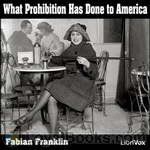 What Prohibition Has Done to America
What Prohibition Has Done to America
In What Prohibition Has Done to America, Fabian Franklin presents a concise but forceful argument against the Eighteenth Amendment of the U.S. Constitution. Beginning in 1920, this Amendment prohibited the sale and manufacture of alcoholic beverages in the United States, until it was repealed in 1933. Franklin contends that the Amendment “is not only a crime against the Constitution of the United States, and not only a crime against the whole spirit of our Federal system, but a crime against the first principles of rational government... | |
By: Founding Fathers of the United States | |
|---|---|
 The Declaration of Independence of the United States of America
The Declaration of Independence of the United States of America
Declaration of Independence is the document in which the Thirteen Colonies declared themselves independent of the Kingdom of Great Britain and explained their justifications for doing so. It was ratified by the Continental Congress on July 4, 1776. | |
By: Frances Burney (1752-1840) | |
|---|---|
 The Wanderer
The Wanderer
This is the fourth and final novel by Fanny Burney, the author of Evelina, Cecilia, and Camilla. "Who is "Miss Ellis?" Why did she board a ship from France to England at the beginning of the French revolution? Anyway, the loss of her purse made this strange "wanderer" dependent upon the charity of some good people and, of course, bad ones. But she always comforts herself by reminding herself that it's better than "what might have been..." This is not only a mystery, not at all. It's also a romance which reminds readers of novels by Jane Austen... | |
By: Francis Archibald Bruton (1860-1929) | |
|---|---|
 Three Accounts of Peterloo
Three Accounts of Peterloo
A companion volume to F.A. Bruton's 'The Story of Peterloo', the full title of this short collection is 'Three Accounts of Peterloo by Eyewitnesses, Bishop Stanley, Lord Hylton, John Benjamin Smith with Bishop Stanley's Evidence at the Trial'. The three contemporary accounts, each with a short introduction by the editor, give different perspectives on the events of 16 August 1819, when a troop of Hussars accompanied by the local Yeomanry rode into a peaceful reform rally at St. Peter's Fields, Manchester, leaving 18 dead and more than 700 injured. | |
By: Francis Bacon (1561-1626) | |
|---|---|
 The New Atlantis
The New Atlantis
In 1623, Francis Bacon expressed his aspirations and ideas in New Atlantis. Released in 1627, this was his creation of an ideal land where people were kind, knowledgeable, and civic-minded. Part of this new land was his perfect college, a vision for our modern research universities. Islands he had visited may have served as models for his ideas. | |
By: Francis Key Howard (1826-1872) | |
|---|---|
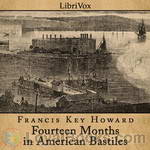 Fourteen Months in American Bastiles
Fourteen Months in American Bastiles
Francis Key Howard recounts in this book his life as a political prisoner of the United States. He points out that he was held captive at the same location where his grandfather was inspired to write the national anthem about the "land of the free," which makes a very stunning contrast. The sufferings that were imposed on him by the Union forces had the effect of solidifying his determination to resist unjust governmental dictates. (Introduction by Katie Riley) | |
By: Frank Norris (1870-1902) | |
|---|---|
 The Octopus
The Octopus
Frank Norris based his 1901 novel The Octopus (A Story of California) on the Mussel Slough Tragedy of 1880, a bloody conflict between ranchers and agents of the Southern Pacific Railroad. The central issue was over the ownership of the ranches, which the farmers had leased from the railroad nearly ten years earlier with intentions of eventually purchasing the land. Although originally priced at $2.50 to $5 per acre, the railroad eventually opened the land for sale at prices adjusted for land improvements; the railroad’s attempts to take possession of the land led the ranchers to defend themselves as depicted in the book. | |
By: Frédéric Bastiat (1801-1850) | |
|---|---|
 Law
Law
"The law perverted! The law—and, in its wake, all the collective forces of the nation. The law, I say, not only diverted from its proper direction, but made to pursue one entirely contrary! The law becomes the tool of every kind of avarice, instead of being its check! The law guilty of that very inequity which it was its mission to punish! Truly, this is a serious fact, if it exists, and one to which I feel bound to call the attention of my fellow-citizens." —Frédéric Bastiat | |
By: Frederick Adams Woods (1873-1939) | |
|---|---|
 Influence of Monarchs
Influence of Monarchs
Frederick Adams Woods presents compelling evidence to support the great man theory of history and his own category scientific inquiry known as historiometry, or the study of history. In this work, the summarised history of fourteen European nations that have achieved renown at some point in their recorded timeline is compared to the biography of their monarchs and demonstrates the strong link between the intellect and willpower of the supreme leadership and the condition of their country. - Summary by Leon Harvey | |
 Mental and Moral Heredity in Royalty. A Statistical Study in History and Psychology
Mental and Moral Heredity in Royalty. A Statistical Study in History and Psychology
Frederick Adams Woods examined the biographical records and family trees of the great dynasties of Europe, judging and comparing their moral standards and intellectual aptitude to their reputation as rulers. The summarised family histories are produced after a painstaking search including portrait galleries, family lineage, comparisons of reputation, and the origin of allegations of madness and moral bankruptcy, all collated within a single volume. - Summary by Leon Harvey | |
By: Fridtjof Nansen (1861-1930) | |
|---|---|
 Norway and the Union with Sweden
Norway and the Union with Sweden
A History of the politics surrounding The Union of Norway with Sweden, from 1814-1905, from the Norwegian perspective - Summary by Ærik Bjørnsson | |
By: Friedrich Engels (1820-1895) | |
|---|---|
 Socialism: Utopian and Scientific
Socialism: Utopian and Scientific
The main idea of "Socialism: Utopian and Scientific" (1880) was distinguishing scientific socialism and utopian socialism. Engels begins by chronicaling the thought of utopian socialists, starting with Saint-Simon. He then proceeds to Fourier and Robert Owen. In chapter two, he summarizes dialectics, and then chronicles the thought from the ancient Greeks to Hegel. Chapter three summarizes dialectics in relation to economic and social struggles, essentially echoing the words of Marx. | |
 Condition of the Working-Class in England in 1844
Condition of the Working-Class in England in 1844
This is Engels' first book (since considered a classic account of England's working class in the industrial age), which argues that workers paid a heavy price for the industrial revolution that swept the country. Engels wrote the piece while staying in Manchester from 1842 to 1844, based on th bohis observations and several contemporary reports conducted over the period. | |
By: Friedrich Schiller | |
|---|---|
 The Thirty Years War
The Thirty Years War
The History of the Thirty Years War is a five volume work, which followed his very successful History of the Revolt of the Netherlands. Written for a wider audience than Revolt, it is a vivid history, colored by Schiller’s own interest in the question of human freedom and his rationalist optimism. Volume 1 covers the background of the war, through the Battle of Prague in late 1620. (Introduction by Alan Winterrowd) | |
By: G. K. Chesterton | |
|---|---|
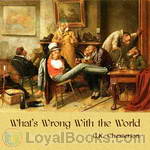 What's Wrong With the World
What's Wrong With the World
Gilbert Keith Chesterton (1874–1936) has been called the “prince of paradox.” Time magazine observed of his writing style: “Whenever possible Chesterton made his points with popular sayings, proverbs, allegories—first carefully turning them inside out.” His prolific and diverse output included journalism, philosophy, poetry, biography, Christian apologetics, fantasy and detective fiction. The title of Chesteron’s 1910 collection of essays was inspired by a title given to him two years earlier by The Times newspaper, which had asked a number of authors to write on the topic: “What’s wrong with the world?”... | |
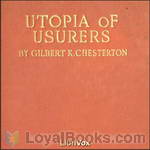 A Utopia of Usurers
A Utopia of Usurers
“Now I have said again and again (and I shall continue to say again and again on all the most inappropriate occasions) that we must hit Capitalism, and hit it hard, for the plain and definite reason that it is growing stronger. Most of the excuses which serve the capitalists as masks are, of course, the excuses of hypocrites. They lie when they claim philanthropy; they no more feel any particular love of men than Albu felt an affection for Chinamen. They lie when they say they have reached their position through their own organising ability... | |
By: Gene Sharp (1928-) | |
|---|---|
 There Are Realistic Alternatives
There Are Realistic Alternatives
Violence in society and politics, whether in the form of war, terrorism, dictatorship, oppression, usurpation, or genocide, is widely recognized as a grave problem. The objective of this essay is to explore a different perspective on the nature of the problem of widespread violence in society and politics that suggests what will be required for its resolution. We need to analyze the conditions under which it will be possible to reduce drastically the reliance on military and other violent means of conflict. We need to examine why violence is so widely regarded as necessary for good causes as well as for bad ones, and how fundamental change away from that syndrome might be achieved. | |
 From Dictatorship to Democracy (version 2)
From Dictatorship to Democracy (version 2)
From Dictatorship to Democracy, A Conceptual Framework for Liberation is a book-length essay on the generic problem of how to destroy a dictatorship and to prevent the rise of a new one. The book was written in 1993 by Gene Sharp (b. 1928), a professor of political science at the University of Massachusetts. The book has been published in many countries worldwide and translated into more than 30 languages. Editions in many languages are also published by the Albert Einstein Institution of Boston, Massachusetts... | |
 From Dictatorship to Democracy
From Dictatorship to Democracy
From Dictatorship to Democracy, A Conceptual Framework for Liberation is a book-length essay on the generic problem of how to destroy a dictatorship and to prevent the rise of a new one. The book was written in 1993 by Gene Sharp (b. 1928), a professor of political science at the University of Massachusetts. The book has been published in many countries worldwide and translated into more than 30 languages. Editions in many languages are also published by the Albert Einstein Institution of Boston, Massachusetts... | |
By: George Bernard Shaw (1856-1950) | |
|---|---|
 Major Barbara
Major Barbara
George Bernard Shaw's Major Barbara focuses on the family of aristocratic Lady Britomart Undershaft and her estranged husband Andrew, a millionaire armaments manufacturer. Their daughters Sarah and Barbara are both engaged to be married, and Lady Britomart decides to ask Andrew for monetary support. Barbara is a Major in the Salvation Army, and agrees to let her father visit the mission in the East End of London where she works. In exchange, she agrees to visit his munitions factory. The conflict between Barbara's philanthropic idealism and her father's hard-headed capitalism clash when he decides he wants to fund the Salvation Army... | |
By: George Eliot (1819-1880) | |
|---|---|
 Felix Holt, The Radical
Felix Holt, The Radical
"Harold Transome is a landowner who goes against his family's political tradition (much to his mother's distress), while Felix Holt is a sincere radical. The setting of the book, the 1832 parliament election, is used to discuss the social problems of that time. A secondary plot involves Esther Lyon, the stepdaughter of a minister who is the real heiress to the Transome estate, with whom both Harold Transome and Felix Holt fall in love. Esther loves poor Felix Holt, but would she choose a comfortable life with Harold Transome?" | |
By: George F. Dillon (1836-1893) | |
|---|---|
 War of Antichrist with the Church and Christian Civilization
War of Antichrist with the Church and Christian Civilization
The War of Anti-Christ with the Church and Christian Civilization is a book written in 1885 by an Irishman, George F. Dillon, DD. It was republished by Fr. Denis Fahey in 1950 as Grand Orient Freemasonry Unmasked as the Secret Power Behind Communism. The central theme of the book alleges that atheistic Illuminism, through the infrastructure of Grand Orient freemasonry, driven by the ideology of the philosophies laid the foundations for a large scale, ongoing war against Christendom in general and Catholic Church in particular... | |
By: George Raffalovich (1880-1958) | |
|---|---|
 Ukraine
Ukraine
“We are not the same nation with Russian people,” the statement which all Ukrainians wish to convey to the whole world for centuries. The striving for freedom and independence is what these people shed much of their blood on Ukrainian lands for. “The Ukraine” by Bedwin Sands describes Ukrainian problem, which exacerbated in the late 19th and early 20th centuries, by looking back at the Ukrainian history, the development of Ukrainian literature and its influence, and by considering its relations with Austria and Russia. | |
By: George Washington Plunkitt (1842-1924) | |
|---|---|
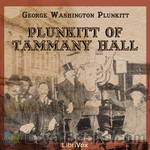 Plunkitt of Tammany Hall
Plunkitt of Tammany Hall
“I seen my opportunities and I took ‘em.”, George Washington Plunkitt of Tamminy Hall. There’s honest graft and dishonest graft according to Plunkitt. Listen to this candid discourse from a 19th century politician, and decide for yourself if things have changed. | |
By: Goldsworthy Lowes Dickinson (1862-1932) | |
|---|---|
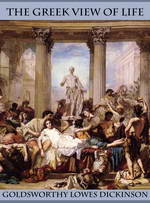 The Greek View of Life
The Greek View of Life
“With the Greek civilisation beauty perished from the world. Never again has it been possible for man to believe that harmony is in fact the truth of all existence.”This elegantly-written work provides a splendid introduction to the Greeks of the classic period: how they thought, wrote, and organised their lives and loves. Although it dates from the 1890s, there is very little about it that has dated. To its author’s credit, the subject of “Greek love” is dealt with in a sane and factual context - despite the judicial assassination of Oscar Wilde going on in the background... | |
By: Grover Cleveland (1837-1908) | |
|---|---|
 State of the Union Addresses by United States Presidents (1885 - 1888)
State of the Union Addresses by United States Presidents (1885 - 1888)
The State of the Union address is a speech presented by the President of the United States to a joint session of the United States Congress, typically delivered annually. The address not only reports on the condition of the nation but also allows the President to outline his legislative agenda and national priorities. This album contains recordings of addresses from Grover Cleveland. - Summary by Wikipedia | |
By: H. G. Wells (1866-1946) | |
|---|---|
 Ann Veronica
Ann Veronica
Ann Veronica was a controversial book detailing the development of a naive school girl into a “New Woman”. When it was published, the Spectator described it as a “poisonous book … capable of poisoning the minds of those who read it.” Although it is unlikely to offend modern listeners in this way, this novel addresses many feminist issues that are still relevant today. | |
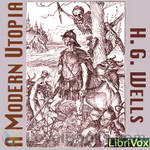 A Modern Utopia
A Modern Utopia
H. G. Wells's proposal for social reform was the formation of a world state, a concept that would increasingly preoccupy him throughout the remainder of his life. One of his most ambitious early attempts at portraying a world state was A Modern Utopia (1905). A Modern Utopia was intended as a hybrid between fiction and 'philosophical discussion'. Like most utopists, he has indicated a series of modifications which in his opinion would increase the aggregate of human happiness. Basically, Wells' idea of a perfect world would be if everyone were able to live a happy life... | |
 Anticipations
Anticipations
Wells considered this book one of his most important, a natural follow-up to such works as his Man of the Year Million and The Time Machine. His goal was to get people to think and act in new ways. The book starts with a look at how humans get along socially and how they carry out their business ventures. It then discusses how these elements influence others, such as politics, the world of work, and education. H. G. tried to make clear how the current social order was disintegrating without preparing another to take its place. He then traced the roots of democracy, which in its present state he saw as unworkable. Instead, he proposed a new republic. He also critiqued modern warfare. | |
 Washington and the Riddle of Peace
Washington and the Riddle of Peace
As an observer at the WASHINGTON CONFERENCE FOR THE LIMITATION OF ARMAMENTS held in 1921 and attended by the victorious nations of The Great War, the acclaimed author H. G. Wells wrote 29 short essays that were serialized in the New York World and other newspapers. This book is a collection of those essays. They are not a record or description of the Conference, but the impressions of one visitor. Wells noted that the failed League of Nations was the first American initiative toward an organized world peace, and in its absence “the American mind has produced this second experiment, which has been tried with the loosest of constitutions and the most severely defined and limited of aims... | |
By: H. L. Mencken (1880-1956) | |
|---|---|
 Notes On Democracy
Notes On Democracy
American journalist H.L. Mencken’s Notes On Democracy was originally published in 1926, yet is still relevant almost 100 years later. Mencken has proposed some succinct and satirical definitions of democracy, such as, “Democracy is the theory that the common people know what they want, and deserve to get it good and hard.” And, “Democracy is the art and science of running the circus from the monkey house.” One predictable result of democracy, Mencken explains, is that the professional politician, who’s objective is always the job, and not the principle, is in a constant struggle for office and its rewards... | |
By: H. Rider Haggard (1856-1925) | |
|---|---|
 The Brethren
The Brethren
Set in the days of the Crusaders, this books tells of a young maiden named Rosamund, and her twin cousins. Godwin is the grey eyed thoughtful man, and Wulf is the blue eyed warrior. They are both knights of England and they are both in love with their fair cousin. But the riddle of the story is which does Rosamund love?The adventure begins when Rosamund is taken from England and carried to the East. The plot thickens as the two young knights follow her in hopes of rescuing her from the Muslim leader, Saladin... | |
By: Harold J. Laski (1893-1950) | |
|---|---|
 Karl Marx: An Essay
Karl Marx: An Essay
Born in Manchester in 1893, Harold Laski was a leading figure in the left-wing of British socialism in the first half of the 20th century. An executive member of the Fabian Society and member of the Socialist League faction of the Labour Party, he was party chairman in 1945-6. As a professor at the London School of Economics he influenced a number of prominent politicians of the post-war years, including leaders of the independence movements of Asia and Africa, and Ralph Milliband, father of the current Labour Party leader, Ed Milliband... | |
By: Harry Thurston Peck (1856-1914) | |
|---|---|
 Twenty Years of the Republic 1885-1905
Twenty Years of the Republic 1885-1905
Excerpt: At the time when Mr. Cleveland was inaugurated there had been no Democratic President for a full quarter of a century. A whole generation had been born and had grown to manhood and to womanhood without ever having lived under any but Republican rule. This long continuance in power of a single party had led many citizens to identify the interest of that party with the interests of the nation. The democrats had been so invariably beaten at the polls as to make Republicans believe that the defeated party had no decent reason for existence, and that is was composed only of wilful obstructionists or of persons destitute of patriotism... | |
By: Henrietta Elizabeth Marshall (1867-1941) | |
|---|---|
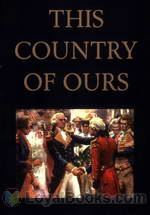 This Country of Ours
This Country of Ours
History made interesting for young readers—This Country of Ours by Henrietta Elizabeth Marshall provides a simple and easy to comprehend way of looking at the history of the United States. Arranged chronologically in seven long chapters, it presents events in a story form, making them memorable and very different from other formats. One of the challenges that writers of history face is about fleshing out the characters and making the bland repetition of dates and dynasties seem relevant to modern day readers... | |
By: Henry Adams (1838-1918) | |
|---|---|
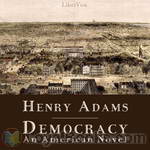 Democracy - An American Novel
Democracy - An American Novel
Not until after his death in 1918 was it revealed that Henry Adams was the anonymous author of Democracy, which had been published to great acclaim in 1880. Though the book avoids dates and the characters are fictitious, the setting is no doubt that of Washington in the 1870s, the age of Presidents Grant and Hayes. The young widow, Madeleine Lee, wealthy and independent, is the protagonist, who leaves her New York for Washington to turn her intelligence to politics and to see what makes her country tick... | |
By: Henry Morgenthau (1856-1946) | |
|---|---|
 Ambassador Morgenthau's Story
Ambassador Morgenthau's Story
Ambassador Morgenthau’s memoirs of his years in the service of the United States in Constantinople, (today Istanbul), are an important primary historical resource for the study of the dissolution of the Ottoman Empire and the Armenian Genocide. During this genocide, approximately 1,500,000 Armenians living in Anatolia were murdered in an attempt to rid Turkey of its non-Turkish populations. Mr. Morgenthau left Turkey a frustrated man, having done all that he was able through diplomatic circles to halt the murders, to no avail... | |
By: Hilaire Belloc (1870-1953) | |
|---|---|
 The Free Press
The Free Press
I propose to discuss in what follows the evil of the great modern Capitalist Press, its function in vitiating and misinforming opinion and in putting power into ignoble hands; its correction by the formation of small independent organs, and the probably increasing effect of these last. (Introduction by Hilaire Belloc) | |
By: Hippolyte Dreyfus-Barney (1873-1928) | |
|---|---|
 The Universal Religion: Bahaism - Its Rise and Social Import
The Universal Religion: Bahaism - Its Rise and Social Import
“Bahaism is not a new religion,” writes Hippolyte Dreyfus-Barney, “It is religion renewed… it does not pretend to represent the whole Truth; on the contrary, it recognises Truth in fundamental principles which are the basis of all former dispensations, and which for that very reason form the standpoint of concord too long lost sight of. And it requires people to renounce ancient superstitions, to abandon the dead letter in order to be penetrated by the living and vivifying spirit, then by... | |
By: Immanuel Kant (1724-1804) | |
|---|---|
 Perpetual Peace, A Philosophic Essay (Trueblood Translation)
Perpetual Peace, A Philosophic Essay (Trueblood Translation)
This essay, written in 1795, puts forth a plan for a lasting peace between nations and peoples. Kant puts forth necessary means to any peace, and argues that nations can be brought into federation with one another without loss of sovereignty. In one translation, telling of the historical impact of this essay, this federation is called a “league of nations.” The supplements and appendices are of considerable interest on their own. The supplements contain an argument regarding the use which nature makes of war, and the way in which nature, in the end, impels us towards peace... | |
By: Jack London (1876-1916) | |
|---|---|
 The Iron Heel
The Iron Heel
A dystopian novel about the terrible oppressions of an American oligarchy at the beginning of the Twentieth Century, and the struggles of a socialist revolutionary movement. (Introduction by Matt Soar) | |
By: Jacob A. Riis (1849-1914) | |
|---|---|
 How the Other Half Lives: Studies Among the Tenements of New York
How the Other Half Lives: Studies Among the Tenements of New York
How the Other Half Lives: Studies Among the Tenements of New York (1890) was a pioneering work of photojournalism by Jacob Riis, documenting the squalid living conditions in New York City slums in the 1880s. It served as a basis for future muckraking journalism by exposing the slums to New York City’s upper and middle class. The title of the book is a reference to a phrase of François Rabelais, who wrote in Pantagruel: "one half of the world does not know how the other half lives". | |
 Neighbors – Life Stories of the Other Half
Neighbors – Life Stories of the Other Half
These stories have come to me from many sources—some from my own experience, others from settlement workers, still others from the records of organized charity, that are never dry, as some think, but alive with vital human interest and with the faithful striving to help the brother so that it counts. They have this in common, that they are true. For good reasons, names and places are changed, but they all happened as told here. I could not have invented them had I tried; I should not have tried if I could... | |
By: James Buchanan (1791-1868) | |
|---|---|
 State of the Union Addresses by United States Presidents (1857 - 1860)
State of the Union Addresses by United States Presidents (1857 - 1860)
The State of the Union address is a speech presented by the President of the United States to a joint session of the United States Congress, typically delivered annually. The address not only reports on the condition of the nation but also allows the President to outline his legislative agenda and national priorities. This album contains recordings of addresses from James Buchanan. - Summary by Wikipedia and Linette Geisel | |
By: James K. Polk (1795-1849) | |
|---|---|
 State of the Union Addresses by United States Presidents (1845 - 1848)
State of the Union Addresses by United States Presidents (1845 - 1848)
The State of the Union address is a speech presented by the President of the United States to a joint session of the United States Congress, typically delivered annually. The address not only reports on the condition of the nation but also allows the President to outline his legislative agenda and national priorities. This album contains recordings of addresses from James Polk. | |
By: James Thomson (1834-1882) | |
|---|---|
 Satires and Profanities
Satires and Profanities
"Believing as I do that James Thomson is, since Shelley, the most brilliant genius who has wielded a pen in the service of Freethought, I take a natural pride and pleasure in rescuing the following articles from burial in the great mausoleum of the periodical press. There will doubtless be a diversity of opinion as to their value. One critic, for instance, has called “The Story of a Famous Old Jewish Firm” a witless squib; but, on the other hand, the late Professor Clifford considered it a piece of exquisite mordant satire worthy of Swift... | |
By: Jane Addams (1860-1935) | |
|---|---|
 Twenty Years at Hull-House
Twenty Years at Hull-House
Jane Addams was the first American woman to be awarded the Nobel Peace Prize. In a long, complex career, she was a pioneer settlement worker and founder of Hull-House in Chicago, public philosopher (the first American woman in that role), author, and leader in woman suffrage and world peace. She was the most prominent woman of the Progressive Era and helped turn the nation to issues of concern to mothers, such as the needs of children, public health and world peace. She emphasized that women have a special responsibility to clean up their communities and make them better places to live, arguing they needed the vote to be effective... | |
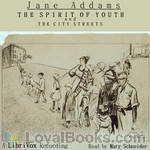 The Spirit of Youth and the City Streets
The Spirit of Youth and the City Streets
Much of the material in the following pages has appeared in current publications. It is here presented in book form in the hope that it may prove of value to those groups of people who in many cities are making a gallant effort to minimize the dangers which surround young people and to provide them with opportunities for recreation. (Introduction by Jane Addams) Jane Addams (1860 – 1935) was the first American woman to be awarded the Nobel Peace Prize. In a long, complex career, she was a pioneer settlement worker and founder of Hull House in Chicago, a public philosopher, a sociologist, an author and a spokesperson for women's suffrage and world peace. | |
By: Jean-Jacques Rousseau | |
|---|---|
 The Social Contract
The Social Contract
The Social Contract outlines Rousseau’s views on political justice, explaining how a just and legitimate state is to be founded, organized and administered. Rousseau sets forth, in his characteristically brazen and iconoclastic manner, the case for direct democracy, while simultaneously casting every other form of government as illegitimate and tantamount to slavery. Often hailed as a revolutionary document which sparked the French Revolution, The Social Contract serves both to inculcate dissatisfaction with actually-existing governments and to allow its readers to envision and desire a radically different form of political and social organization. (Summary by Eric Jonas) | |
By: Jeremy Bentham (1748-1832) | |
|---|---|
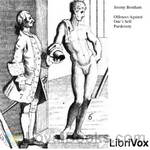 Offences Against One's Self: Paederasty
Offences Against One's Self: Paederasty
Jeremy Bentham (1748-1832) was an English jurist, philosopher, and legal and social reformer. He was a political radical and a leading theorist in Anglo-American philosophy of law. He is best known as an early advocate of utilitarianism and animal rights who influenced the development of liberalism. The essay Offences Against One’s Self (c. 1785), argued for the liberalisation of laws prohibiting homosexuality. The essay remained unpublished during Bentham’s lifetime for fear of offending public morality... | |
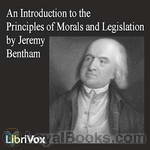 An Introduction to the Principles of Morals and Legislation
An Introduction to the Principles of Morals and Legislation
Jeremy Bentham's Introduction to the Principles of Morals and Legislation, a classic text in modern philosophy and jurisprudence, first published in 1789, focuses on the principle of utility and how this view of morality ties into legislative practices. Bentham's ambition in life was to create a complete Utilitarian code of law. The philosophy of utilitarianism argues that the right act or policy is that which would cause "the greatest good for the greatest number of people", also known as "the greatest happiness principle", or the principle of utility... | |
By: Johanna Brandt (1876-1964) | |
|---|---|
 The Petticoat Commando
The Petticoat Commando
In introducing the English version of this book I venture to bespeak a welcome for it, not only for the light which it throws on some little-known incidents of the South African war, but also because of the keen personal interest of the events recorded. It is more than a history. It is a dramatic picture of the hopes and fears, the devotion and bitterness with which some patriotic women in Pretoria watched and, as far as they could, took part in the war which was slowly drawing to its conclusion on the veld outside... | |
By: John Addington Symonds (1840-1893) | |
|---|---|
 A Problem in Modern Ethics
A Problem in Modern Ethics
“Society lies under the spell of ancient terrorism and coagulated errors. Science is either wilfully hypocritical or radically misinformed.” John Addington Symonds struck many an heroic note in this courageous (albeit anonymously circulated) essay. He is a worthy Virgil guiding the reader through the Inferno of suffering which emerging medico-legal definitions of the sexually deviant were prepared to inflict on his century and on the one which followed. Symonds pleads for sane human values in... | |
By: John Eliot (1604-1690) | |
|---|---|
 Christian Commonwealth
Christian Commonwealth
John Eliot, a North American missionary, advocates for post-civil-war England to adopt a representative democracy, using the Mosaic Law as a model. | |
By: John Locke (1632-1704) | |
|---|---|
 Two Treatises of Civil Government
Two Treatises of Civil Government
The Two Treatises of Civil Government is a work of political philosophy published anonymously in 1689 by John Locke. The First Treatise is an extended attack on Sir Robert Filmer’s Patriarcha, which argued for a divinely-ordained, hereditary, absolute monarchy. The more influential Second Treatise outlines a theory of civil society based on natural rights and contract theory. Locke begins by describing the “state of nature,” and goes on to explain the hypothetical rise of property and civilization, asserting that the only legitimate governments are those which have the consent of the people... | |
By: John Lothrop Motley (1814-1877) | |
|---|---|
 Causes Of The American Civil War
Causes Of The American Civil War
John Lothrop Motley was an American author and popular diplomat, who helped to prevent European intervention on the side of the Confederates in the American Civil War. In 1861, just after the outbreak of the American Civil War, Motley wrote two letters to The Times defending the Federal position, and these letters, afterwards reprinted as [this] pamphlet entitled Causes of the Civil War in America, made a favourable impression on President Lincoln. Partly owing to this essay, Motley was appointed... | |
By: John Maynard Keynes (1883-1946) | |
|---|---|
 Economic Consequences of the Peace
Economic Consequences of the Peace
The Economic Consequences of the Peace (1919) was a best seller throughout the world, published by John Maynard Keynes. Keynes attended the Versailles Conference as a delegate of the British Treasury and argued for a much more generous peace with Germany. The book was critical in establishing a general worldwide opinion that the Versailles Treaty was a brutal and unfair peace towards Germany. It helped to consolidate American public opinion against the treaty and involvement in the League of Nations... | |